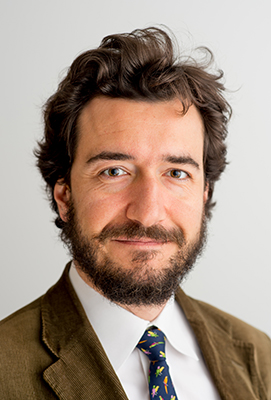Voices from the World

Japan confronts major upheavals in world politics. As China re-emerges to regional centrality, the relative decline of the United States of America translates into a more inward-looking foreign policy. Since international politics have turned more conflictual, governments around the world have emphasized “strategic communications” as an important tool of statecraft, meant for winning hearts and minds at home and abroad. In a nutshell, strategic communications is defined as state-led "use of words, actions, images, or symbols to influence the attitudes and opinions of target audiences to shape their behavior in order to advance interests or policies, or to achieve objectives. For the military […] it includes creating conditions that define a desired end-state."*1 Japan is no exception and, starting with the Abe administration, it has overhauled its foreign and security policy especially in the communication dimension.
My research project contributes to the fields of Foreign Policy Analysis and International Security by tackling the under-researched relationship between recent changes in Japanese domestic policy institutions and Japan’s diplomatic and security practice, with specific emphasis on the communications field. The project has focused on the long historical roots of Japan’s strategic communications and has asked about the changes brought in recent years. Specifically, what is so “strategic” about the Japanese government’s information efforts and in which fields does its practice differ from the past? Propaganda, public diplomacy or military signaling? How does it compare to the major efforts by China, South Korea and Japan?
TIFO has helped considerably to provide answers to the above questions. Through TIFO’s support I have organized a series of international workshops with the help of academics from the Asian Security & Warfare Research Grou, the Lau China Institute and, especially, King’s Centre for Strategic Communications. The participation of Japan and East Asia-based experts, journalists, academics and think-tankers have provided substantial insights on current trends and it has snowballed into a research network on strategic communications across the Asia-Pacific. Moreover, the participation of members of practitioners has strengthened the understanding of UK policymakers of Japan’s communications efforts. I have devised an MA module on strategic communications in the Asia-Pacific with good reviews from attending students. Publications on the subject are also in the pipeline, culminating in several articles and a book project. All of the above would have been impossible without TIFO’s support. I am truly indebted to TIFO because it has provided me with the opportunity to increase my research profile, allowing me to venture on a cutting-edge (and hot) topic that necessarily relies on local experts and practitioners. TIFO is the best Japanese sponsor of blue sky research I can think of and, in itself, is a major source of Japanese soft power! Japan needs more of this and I wish a very long life to TIFO for the benefit of Japan-related research everywhere. Thank you and, as Romans used to say, “ad maiora!” (To even greater things!)
1. James P. Farwell, Persuasion and Power: The Art of Strategic Communication, Washington DC: Georgetown University Press, 2012.

日本は世界の政治の劇的な変化に対峙しています。中国が地域的な中核的存在として再浮上するにつれて、アメリカは相対的に後退し、内向きの外交政策に変わってきています。 国家間の政治的対立が増すにつれ、世界中の政府が「戦略的コミュニケーション」を強く訴えかけ、政治遂行上の重要なツールとしています。目的は国内外で支持を得るためです。「戦略的コミュニケーション」とは、一言で言えば、政府主導で使われることばや行為、イメージ画像、あるいはシンボルのことを指し、対象となる聴視者の見方や意見に影響を与えて政策や目的を達成するためのものです。また、軍事的側面からみた戦略的コミュニケーションでは、基本的には、望ましい最終的な状態をめざして宣伝、心理作戦などを展開するのです。日本も例外ではなく、安倍政権をしても、特に外交および安全保障政策でのコミュニケーションの側面を徹底的に見直しました。
私の研究プロジェクトでは、外交分析と国際安全保障について、特にコミュニケーションの分野を中心に進めます。日本の国内政策機関の最近の変化と日本の外交および安全保障活動との間の関係について、この研究がまだ研究しつくされていないので、頑張って取り組んでいきます。さらに、本プロジェクトは、日本の戦略的コミュニケーションの長い歴史的ルーツに焦点を当て、近年の変化を解明していきます。具体的には、日本政府の情報提供への取り組みにおいて「戦略的」とは何か、またその実践は過去とどの分野で異なるか、プロパガンダ、公的外交、あるいは軍事的なシグナルなのか、を研究していきます。また、中国、韓国、日本の戦略を比較するとどうなのか、という点も掘り下げます。
上記の問題提起に対する答えを得るにあたり、TIFOからの支援は大きく寄与しました。 おかげさまで、私はいくつかの国際的なワークショップを、アジア安全保障戦争研究グループ、ラウチャイナ研究所、そして特にキングスカレッジ戦略コミュニケーションセンターの研究者の助けを借りて、開催することができました。このワークショップには、日本と東アジアの専門家、ジャーナリスト、学者、シンクタンクからの参加を得て、現状についての深い洞察を得ることができました。さらに同ワークショップは、アジア太平洋地域の戦略的コミュニケーションに関する研究ネットワークに発展しました。加えて、実務家のメンバーが参加したことで、日本のコミュニケーション政策に関する英国側の政策立案者が理解を深めることができました。また、アジア太平洋地域での戦略的コミュニケーションに関し、修士学生が参加するクラスも考案、実施したところ、出席した学生から好評を得ることができました。このテーマでの出版も見込むことができ、論文集へと花開く予定です。 TIFOの支援がなければ、上記のすべてはできていなかったかもしれません。私はTIFOに本当にお世話になりました。私の研究分野を深める機会を提供してくれたので、私は当該地域の専門家や実務家に会わねば分からない、最先端の(そして熱い)テーマに取り組むことができました。 TIFOは私の、ほとんど端緒を開いたばかりの、青空のような研究に対してのスポンサーとして最高であり、TIFO自体が、日本のソフトパワーの大事な源でもあります!日本はもっとソフトパワーを必要としています。そして、私はTIFOに世界各地での日本研究の発展に貢献してもらいたいので、長く存続することを望みます。
感謝の気持ちと、ローマ人の言葉「ad maiora!」(さらに大いなる幸運を!)を、彼らの意図と同じ意味で送ります。



